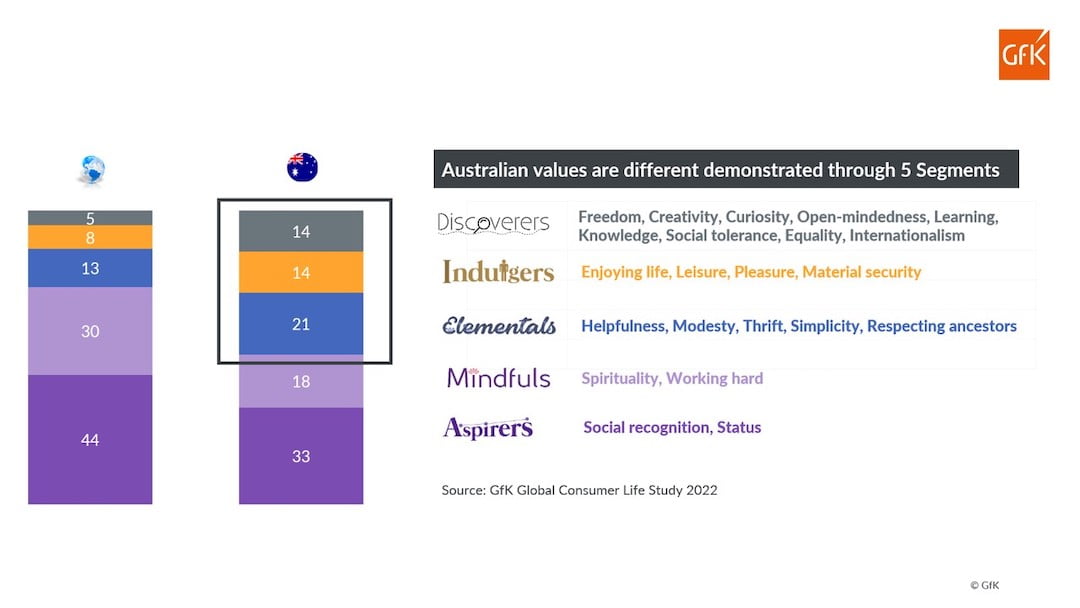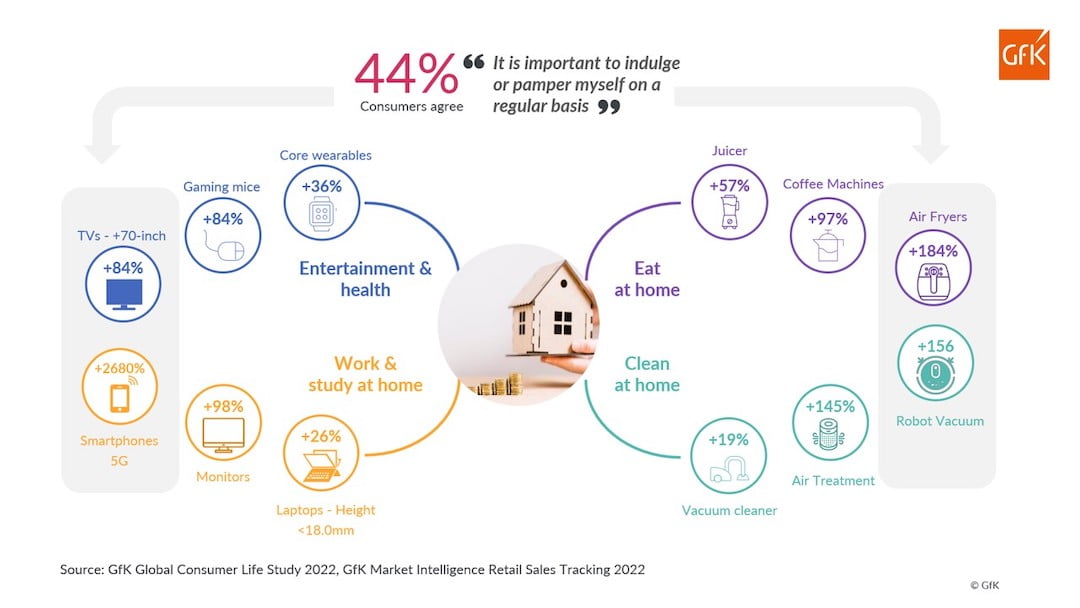In this article, we take a look at how Aussie consumers are adapting and recovering to a new ‘consumerism order,’ where radical shifts have motivated consumers to make intentional, mindful and ambitious value-based decisions.
Values are deep, personal human truths and influence how we see the world. And these truths should form the guiding principles of every business’ marketing and sales strategy. They can also be the real point of difference in your business.
Businesses often look at different consumers by generation, market trends and consumer intelligence. But consumer values are the cornerstone that really drives influence. In fact, 62 per cent of consumers say they only buy products and services that appeal to their beliefs, values or ideals.
GfK has been tracking consumer values in 30 markets around the globe for a quarter of a century. Interestingly, it found that Australia’s key values typically differ from the rest of the world. Australians value honesty, protecting family, authenticity, freedom and enjoying life the most. When compared to the globe against five segments (Discoverers, Indulgers, Elementals, Mindfuls and Aspirers), Australians land mostly in the Discoverers, Indulgers and Elementals categories.
Our research supports the fact that Australians are different. So when we look at global consumers and get global data, it doesn’t necessarily work in this market. Australian consumers love their freedom. They’re pleasure seekers. Material security is important to them. They want to enjoy life. Health and fitness are very important to them. These personal values drive their thinking. And businesses can tap into that opportunity to find better ways to connect with the Australian consumer.

Evolving consumer values
Whilst core values tend to stay relatively stable and consistent, they do eventually evolve and manifest in new ways. And understanding that as it relates to consumers is critical to driving your strategy. For example, as people grow older, they tend to pick up the values of their parent’s generation. They tend to value things less about ambition and more about enjoying life and embracing faith as they age. At the same time, big life events or traumas also cause a shift in values. COVID, for example, placed a huge emphasis on health and fitness. It also caused consumers to shift their values in terms of what’s important to them.
Brands tend to do well at understanding category predispositions based on consumer needs, attitudes and predispositions of choice. However, brands don’t do very well when understanding those implicit, deeper values that are held — the things that have the power to build a stronger emotional connection with consumers by addressing their deeper, underlying implicit forces of choices. At GfK, we look at the explicit and implicit when building strategies for our clients.
In a nutshell, consumer values help drive product strategy. They help businesses understand nuances beyond demographics, geographies, attitudes and needs. And they drive messaging, innovation and brand positioning by enabling businesses and brands to connect with the consumer on a deeper level beyond the surface of what consumers say.

GfK research shows that 44 per cent of consumers say it is important to indulge or pamper myself on a regular basis.
The opportunity of home
Home has always been the HQ (headquarters) of our lives, but increasingly, we’re spending even more time at home. According to GfK research, 71 per cent of consumers cook at home for fun, 70 per cent work or study from home and 45 per cent enjoy gardening at home. Others perform home maintenance and repairs (37%) and approximately a quarter (27%) entertain guests in the home.
Interestingly, GfK’s research also finds that Australians are spending more time at home than any other country across the world. In fact, roughly 40 per cent of us are working remotely. It’s a reflection of our labour force, which is largely professional and financial services.
Hybrid environments are driving increases to our lives at home, particularly around strong premiumisation and indulgence. For example, instead of dining out, more and more people are choosing to cook at home or order from a food delivery service.
In this “new world”, GfK research shows that 44 per cent of consumers say it is important to indulge or pamper myself on a regular basis. This sentiment has led to an increase in purchases across the home in areas like entertainment, health, work, study, cleaning and dining. For example, there’s been a 57 per cent increase in juicer purchases, 184 per cent air fryer purchases and 2,680 per cent increase in Smartphones 5G purchases.

We’re looking for convenience, and we’re buying into technology and appliances at home. And it’s not just products. Subscription video on demand is also seeing significant increases as we spend more time at home. At the same time, radio streaming has seen more than a 122 per cent increase.
For brands, GfK research reveals that for higher-spend items like food processors, dishwashers, ovens and fridges, consumers want to be educated and inspired in-store. However, when it comes to smartphones, laptops and fitness wearables, consumers generally go into the store knowing exactly what brand/model they want. The opportunity there is to upsell them on accessories like cases and extended warranties.
This opens an interesting opportunity for local businesses to capitalise on category premiumisation — a trend that is driving strong sales value growth. It’s time to invest in the right marketing touchpoints, pre-store versus in-store with core messages of value versus trade-up.

GfK research reveals that for higher-spend items like food processors, dishwashers, ovens and fridges, consumers want to be educated and inspired in-store.
Finding opportunities, not excuses
Now is the time not to make excuses but to drive actionable insights from trends. It’s time to understand deep consumer values that shape behaviour in your business, and pivot your strategy as the world recovers to a new era of consumerism. When met with macro-economic trends that create a “doom and gloom” scenario, remember home is the HQ. There’s been strong growth for consumer durables, up 12 per cent.
If you’re up against stock issues, focus on a particular retailer or channel strategy and review promotional frequency and depth linked to events. When it comes to shipping costs, they’re actually coming down, when compared to what they were last year and raw material costs are also decreasing.
In this new world, consumer behaviours are different. Find opportunity in understanding and using consumer values as foundations for your brand strategy to pull apart your industry or category landscape. And when mountains of data leave you feeling overwhelmed, create a roadmap for improvement that balances human intuition with data intellect to drive better business outcomes.
4 ways values help businesses build a deeper emotional connection with consumers
- Values guide principles beyond demographics
- Values ground innovation at a deeper level
- Values strengthen messaging connections
- Values are key to differentiation and portfolio management
5 questions to ask to power your business:
- Present: Against unfavourable macro-economic trends, where are the growth opportunities?
- Future: How do we plan for the future?
- Where: Where should we target and advertise?
- Who: Who should we be targeting and how to reach them?
- How: With so many different data sources, how do we form it into one coherent piece?

Mitesh Khatri, Head of Consumer Intelligence and Consulting ANZ, GfK.
About the Author
Mitesh Khatri, Head of Consumer Intelligence and Consulting ANZ, GfK.
Mitesh is an expert in helping businesses lead by defining business problems clearly, creating stronger use of data and insights, and driving more innovative approaches, all underpinned by his strong understanding of consumers. Mitesh has worked with more than 150 companies, including some of Australia’s largest, across 400+ categories in the ANZ region. His industry experience includes Retail, FMCG, Media, Consumer Technology and Durables, Travel and Banking, and more. Mitesh holds an MBA from Macquarie Graduate School of Management.
About GfK
GfK. Growth from Knowledge.
For over 85 years, we have earned the trust of our clients around the world by solving critical business questions in their decision-making process around consumers, markets, brands and media. Our reliable data and insights, together with advanced AI capabilities, have revolutionized access to real-time actionable recommendations that drive the marketing, sales, and organizational effectiveness of our clients and partners. That’s how we promise and deliver “Growth from Knowledge”.
For more Australian businesses stories, click here.

